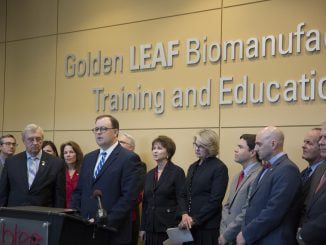CHAPEL HILL — At a March 22 meeting of the University of North Carolina Board of Trustees (UNC BOT), a resolution was approved that supports a recent policy change to curb “compelled speech.”
UNC BOT member and Strategic Initiatives Committee Chair Perrin Jones introduced and read the resolution supporting the amendment of UNC Policy Section 300.5.1. The approved policy revision in that section restricts “vague or ideologically motivated statement policies of any kind across UNC campuses” in admissions, employment and professional advancement.
“Make no mistake, compelled speech is compelled thought,” Perrin said during his remarks. “Forcing statements, regardless of the goodness of their intent, is wrong, as it violates an individual’s right to think, speak, and act in an honest and open manner.”
The resolution also asks that the “Chancellor inform the Board of the progress” of items referenced in the document at the UNC BOT’s May 2023 meeting.
Provost and Chief Academic Officer at UNC Chapel Hill Chris Clemens told the UNC BOT that the changes to various applications, hiring and promotion areas touched by the policy change “will mostly be completed within a month.”
In an interview with Jones before the resolution was introduced, he told North State Journal the language of the resolution “broadly restates state law, federal law and UNC Board of Governors policy.”
“The resolution is standing in appreciation of the chancellor and the provost and their commitment to the principle of not allowing compelled speech on campus and also implementing the BOG policy on campus,” said Jones.
When asked if he thought the policy and resolution would be picked up by other UNC System schools, Jones said he believes in free speech and that “compelled speech is compelled thought.”
“In that regard, I would hope that all universities would share the same values in terms of protecting freedom of speech, freedom of thought and freedom of conscience on their campus,” Jones said.
The revisions to Policy 300.5.1, “Political Activities of Employees,” was first introduced at a meeting of the UNC Board of Governors (BOG) Committee on University Governance held on Jan. 18 of this year and was approved on Feb. 23 by the UNC BOG.
“University shall neither solicit nor require an employee or applicant for academic admission or employment to affirmatively ascribe to or opine about beliefs, affiliations, ideals, or principles regarding matters of contemporary political debate or social action as a condition to admission, employment, or professional advancement,” the revision states. “Nor shall any employee or applicant be solicited or required to describe his or her actions in support of, or in opposition to, such beliefs, affiliations, ideals, or principles.”
The policy revision also bars “solicitations or requirements for statements of commitment to particular views on matters of contemporary political debate or social action contained on applications or qualifications for admission or employment.”
The support resolution builds on a free speech resolution passed by the UNC BOT in July 2022 that confirmed the board’s commitment to “institutional neutrality” as described in the Kalven Committee Report produced by the University of Chicago.
A motion was made during the meeting to add a reference to the three-page memo issued by the UNC System Division of Legal Affairs on March 17. The memo outlines the “implementation of policy on compelled speech.”
“The Amendment strikes a content-neutral balance,” the guidance reads in part. “Nothing in the Amendment prohibits open-ended questions of candidates that could elicit any number of voluntary responses.
“On the other hand, the Amendment prohibits leading questions that could signal to the candidate that the questioner prefers a particular answer. Leading questions about a candidate’s beliefs on matters of contemporary political debate or social action destroy the core notion of voluntariness driving the Amendment because the questions signal an expected orthodoxy or conformity from the responding candidate.”



